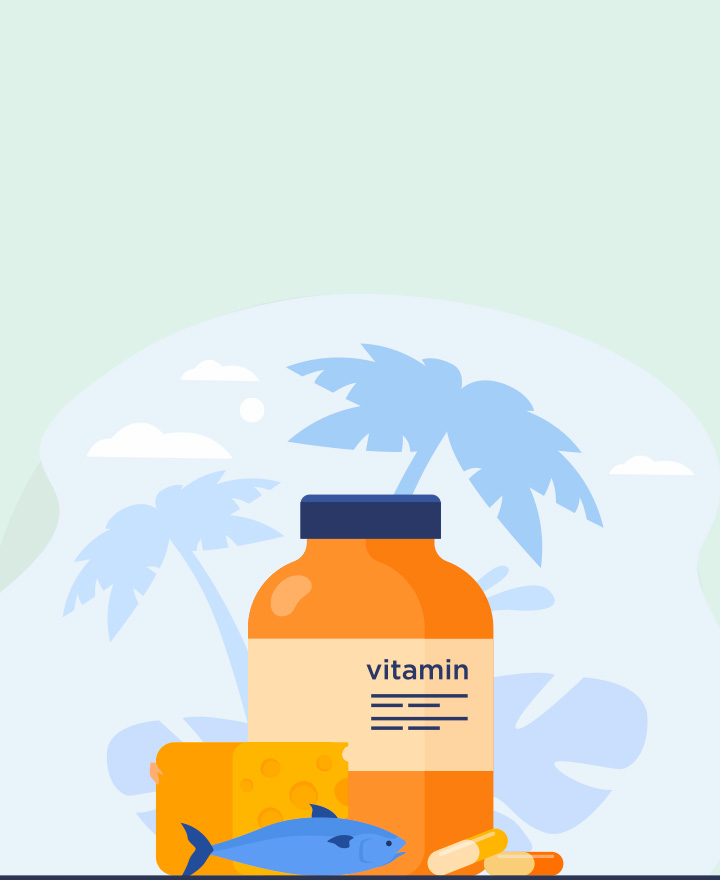

Food to Eat & Avoid To Overcome Vitamin B12 Deficiency
Vitamin B12 or Cobalamin is an important nutrient needed by the human body for various metabolic processes. This water-soluble nutrient keeps your nerve cells functioning normally and helps in red blood cell production as well as DNA synthesis. As animal-based foods such as meat, fish, poultry and dairy are the predominant natural sources of this vitamin; a Vitamin B12 deficiency can affect those who follow a vegetarian or vegan diet.
Medical conditions such gastritis, pernicious anemia, and certain digestive diseases, which disrupt the normal functioning of the stomach, can also cause a Vitamin B12 deficiency. This is because stomach produces a protein called intrinsic factor, which is necessary for effective absorption of Vitamin B12 into the body.
Vitamin B12 Requirement and Deficiency
The recommended intake of Vitamin B12 for adults is 2.4 micrograms per day. As this is a water soluble nutrient, the human body absorbs only what is required and the excess is removed through urine.
A deficiency or insufficiency of Vitamin B12 can lead to anemia, fatigue, muscle weakness, intestinal problems, nerve damage, and mood disturbances.
Foods Rich in Vitamin B12
Animal-based foods are high in Vitamin B12, and this vitamin is not naturally found in plant-based foods. Some Vitamin B12 rich foods are:
Milk
Milk is a good source of vitamin B12 and D as well as calcium and protein. If a vegan, then the same can be replaced with any plant-based milk that is fortified with Vitamin B12.
Eggs
Eggs are an excellent source of proteins and many vitamins, including B12. Two hardboiled contain around 1.6 micrograms of Vitamin B12, with egg yolk containing more of this nutrient as compared to the egg white.
Fish
Fish such as salmon, tuna, trout, etc. are very rich in Vitamin B12 and protein.
Beef
The amount of Vitamin B12 in beef depends on what part of the animal is consumed. Beef liver provides about 71 micrograms of Vitamin B12 in a 3-ounce serving. So a serving of red meat once or twice a week can meet your weekly B12 requirement. Lean meat usually contains a high level of vitamin. Beef is also a great source of iron and protein.
Yoghurt
Yoghurt provides calcium, vitamin D, as well as Vitamin B12. You can have fat-free yoghurt in place of full-fat if you are watching your calorie intake.
Chicken
You get 0.3 micrograms of Vitamin B12 from a serving of 100 grams of roasted chicken. Chicken is also an excellent source of protein.
Nutritional yeast
Fortified nutritional yeast is best for people who do not consume meat or dairy. It tastes cheesy and nutty, and can be sprinkled over pasta as a replacement for cheddar cheese. A serving of 15 grams of nutritional yeast could contain around 733% of the daily requirement of Vitamin B12.
Animal liver and kidneys
These two organs are densely packed with nutrients, especially Vitamin B12. Lamb liver also contains high amounts of copper, Vitamins A & B2, and selenium.
Cheese
Among cheeses, Swiss cheese has the highest amount of Vitamin B12. A 100 gram serving of Swiss cheese can provide 3.3 micrograms of Vitamin B12.
Vitamin B12 fortified foods
Vegetarians and Vegans can go for cereals fortified with essential nutrients to get their daily consumption of Vitamin B12. Apart from plant-based milk and fortified cereal, vegans can try tofu, marmite, etc., as they are also good sources of vitamin B12.
Conclusion
Vitamin B12 is an essential nutrient that supports numerous metabolic functions of our body. This water-soluble vitamin is found in dairy products, meat, fish, and fortified foods. It is a good idea to get your Vitamin B12 levels checked and supplement them in case of deficiency or insufficiency.
One of the important components of our overall wellness is also being financially secured. Healthcare emergencies can happen any time, but a good health insurance policy can protect you from such uncertain situations. To know more about Wellness and other health related tips, visit the wellness corner.
Disclaimer: This blog provides general information and discussions about health and related subjects. The information and other content provided in this blog, website or in any linked materials are not intended and should not be considered, or used as a substitute for, medical advice, diagnosis or treatment. Kindly contact your Doctor before starting a new medicine or health regime.
Source: WebMD, Times of India
Related Articles
Planning To Go On A Diet? Here Are 5 Questions To Ask First
What To Eat For Healthier Aging? Here's How Your Nutritional Needs Change As You Age
Tips To Control Your Cravings While Working From Home
Published on August 05, 2022



























 Health Insurance
Health Insurance  Travel Insurance
Travel Insurance  Car Insurance
Car Insurance  Cyber Insurance
Cyber Insurance  Critical Illness Insurance
Critical Illness Insurance
 Pet Insurance
Pet Insurance
 Bike/Two Wheeler Insurance
Bike/Two Wheeler Insurance  Home Insurance
Home Insurance  Third Party Vehicle Ins.
Third Party Vehicle Ins.  Tractor Insurance
Tractor Insurance  Goods Carrying Vehicle Ins.
Goods Carrying Vehicle Ins.  Passenger Carrying Vehicle Ins.
Passenger Carrying Vehicle Ins.  Compulsory Personal Accident Insurance
Compulsory Personal Accident Insurance  Travel Insurance
Travel Insurance  Rural
Rural